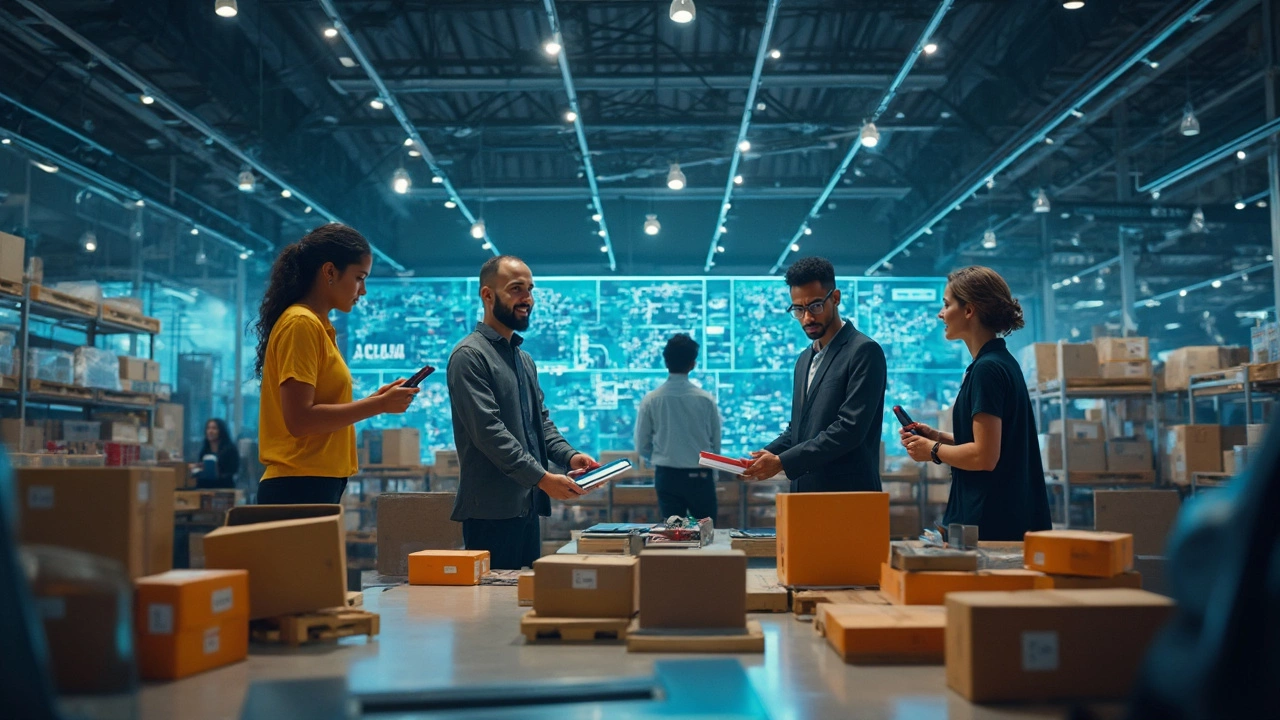Ever wondered how your online order magically arrives at your doorstep, sometimes in less than a day? That’s the e-commerce logistics specialist behind the scenes, pulling all kinds of strings. Their job is a balancing act between warehouses, shipping partners, inventory tools, and customer promises—and none of it just happens on its own.
The reality is, even the slickest online shop can wreck a good sale just by bungling the delivery. Logistics specialists step in to smooth every bump, tracking orders in real-time, fighting for the best delivery prices, and jumping on problems the second they come up. If the system crashes, or a shipment gets stuck in customs, they’re the ones getting frantic texts in the middle of the night.
A good specialist doesn’t just follow the process—they look for ways to speed it up, cut costs without cutting corners, and keep returns from becoming a profit-sucking black hole. In a world where customers want fast shipping but don’t want to pay extra, these folks are finding creative ways to make it all happen. Want to be one? Or maybe you just want to understand what’s really happening after you hit the checkout button. Either way, it’s a much wilder ride than you probably thought.
- Core Responsibilities in the E-commerce Supply Chain
- Tools and Tech that Power Their Work
- How Specialists Keep Customers Happy
- Tips for Breaking Into the Field
Core Responsibilities in the E-commerce Supply Chain
If you’ve ever wondered what an e-commerce logistics specialist actually does all day, it’s mostly about keeping the flow of goods running smoothly from the online shop to your front door. They handle a bunch of tasks that keep the business ticking—and without them, even the best product can sit lost in a warehouse.
First up: inventory management. Logistics specialists keep tabs on what’s in stock and what’s running low. They work with tools that track every item, so customers aren’t able to order stuff that isn’t really there. Big online retailers like Amazon rely on real-time systems for this, but even smaller shops need someone who’s watching the digital shelves closely.
Next, shipping and order fulfillment takes center stage. Specialists pick the right shipping carriers, compare rates daily, and set up relationships with couriers to cut down delivery times. Getting an order from a warehouse to a customer, whether it’s across town or across the world, definitely isn’t the same thing every time. Each order can mean different shipping rules and customs paperwork depending on where it’s going.
Let’s not forget about process optimization. Every minute counts with online orders. A good logistics specialist is always looking to shave time off a step, avoid costly mistakes, and react quickly when something gets delayed. For example, switching to a local courier for short-distance orders can speed up delivery and cut down on costs. They’re always testing things to see what works best.
Returns management is another big job. Around 20-30% of online shopping orders end up getting sent back, especially in categories like fashion. So, these specialists put systems in place to handle returns fast, minimize errors, and try to recover costs. Fast returns actually make shoppers more likely to buy in the first place.
Here’s a quick table to see how these responsibilities usually stack up:
| Task | Time Spent (approx.) |
|---|---|
| Inventory Management | 25% |
| Shipping & Order Fulfillment | 35% |
| Process Optimization | 20% |
| Returns Management | 20% |
All these duties feed into one goal: making sure every order gets where it’s supposed to go, as fast and as cheap as possible. The best specialists are the ones who notice problems before anyone else does, and fix them before the customer ever knows something was off.
Tools and Tech that Power Their Work
Every e-commerce logistics specialist has a tech toolbox that keeps orders zipping from warehouse shelves to customer doors. The days of tracking packages on sticky notes are over—software now runs the show, and it’s getting smarter every year.
The centerpiece? Warehouse Management Systems (WMS). These systems keep tabs on every last product in storage, flagging when inventory runs low and helping teams speed-pick items for orders. Big names like NetSuite and Fishbowl lead the pack, letting staff slice hours off their daily routines.
Then there’s the Order Management System (OMS). Imagine trying to juggle thousands of orders from Amazon, Shopify, and eBay—all at once. OMS tools juggle everything, so that nothing crashes down. Specialists favor software like ShipStation or Brightpearl, which also connect easily with couriers for real-time tracking and updates.
- Real-time shipment tracking lets specialists monitor every parcel’s journey. With tools like AfterShip, if a package goes missing or hits a customs snag, the team knows right away—not after an angry customer emails support.
- Shipping rate calculators crunch numbers in seconds, helping specialists choose the cheapest or fastest option for each order. No more overpaying or guesstimating. They often use platforms like Easyship for this job.
Some teams are stepping up their game with automation—think robots picking items or conveyor belts that sort packages way faster than humans ever could. In fact, according to a 2024 study published by Statista, about 40% of large fulfillment centers in the US now use some sort of robotics for order picking and packing.
| Tool/Tech | Main Use |
|---|---|
| Warehouse Management System (WMS) | Tracks storage, inventory, and product movement |
| Order Management System (OMS) | Manages and processes orders from multiple channels |
| Shipping Integrator (e.g., ShipStation) | Links stores to couriers and tracks shipments |
| Automation (robots, conveyors) | Speeds up picking, packing, and sorting |
None of this matters if specialists can’t use the data. Analytics dashboards are a daily go-to, showing bottlenecks or extra costs in plain sight, so they can jump in and fix stuff before it snowballs into customer complaints or late orders.

How Specialists Keep Customers Happy
No matter how cool a website looks, mess up the shipping and customers are gone. E-commerce logistics specialists know that fast, reliable delivery is the real way to win someone’s loyalty. Here’s what they do to keep those five-star reviews rolling in.
They’re obsessed with communication. Tracking numbers go out the second an order is packed. If there’s a delay, an update lands in your inbox before you even think to ask. This transparency is a game changer—studies show that 83% of shoppers expect regular updates on their delivery status. When specialists nail this, customers stay calm, even if something’s running late.
- Real-time tracking: They set up systems letting customers watch their package hop from warehouse to delivery truck. No more guessing games.
- Fast shipping options: Specialists strike deals with multiple carriers. This means shoppers can pick same-day, next-day, or the cheapest slow boat—whatever works best.
- Smooth returns: Hassle-free return labels and drop-off points are key. Research from 2024 showed 92% of customers are more likely to buy again if returns are easy.
- Problem-solving on the fly: If something gets lost or damaged, these pros handle claims and replacements fast. They talk to warehouses, delivery drivers, even customs if needed, so you get what you ordered—or your money back.
Let’s get concrete. Here’s a snap-shot of what shoppers care about and how specialists are racing to meet those needs:
| Customer Need | Specialist Solution |
|---|---|
| Fast delivery | Partner with express couriers, optimize warehouse picking |
| Easy tracking | Integrate order tracking in account portal and email/text alerts |
| No surprises | Send updates for every status change and immediately flag issues |
| Simple returns | Provide pre-paid labels and automated return authorizations |
| Quick problem resolution | Offer live chat and 24/7 support for delivery hiccups |
Bottom line: logistics specialists are on the customer’s side. Their behind-the-scenes hustle is what makes you trust buying from an unknown online store—or stick with your favorite brand, time and time again.
Tips for Breaking Into the Field
Thinking about diving into the world of e-commerce logistics? You don’t need an ivy league degree to get noticed here, but you do need the right mix of know-how and hustle. Here’s what pays off if you want to get your foot in the door as an e-commerce logistics specialist:
- Level up your Excel and tech game. The pros in this space can wrangle data fast—think pivot tables, inventory software, and the basics of ERP systems like NetSuite or SAP. Even small companies want people who can spot trends in tracking sheets.
- Get a grip on shipping rules and customs basics. If you understand how things move across borders, you’re ahead of half the resumes in the pile. Tutorials from major shipping firms (UPS, FedEx, DHL) are free online, and the info’s practical.
- Work experience matters—any kind. If you’ve packed boxes, sorted returns, or helped with order tracking—even at a small scale—that’s gold. A lot of leaders actually started out in warehouses or customer service.
- Show off your communication skills. This job means talking to truck drivers, picky customers, and IT nerds, sometimes all in the same hour. Try for internships or part-time work that puts you in cross-team situations.
Consider getting certified. The CSCMP’s SCPro™ Certification or an APICS designation looks good, but what’s even better is proof you can use their know-how in real-world settings. If you’re into stats, here’s what employers are looking for, according to a 2024 LinkedIn survey:
| Top Skill | Percent of Employers Wanting It |
|---|---|
| Inventory Management | 66% |
| Data Analysis | 57% |
| Shipping & Customs | 52% |
| Communication | 48% |
For job hunting, keep an eye on roles like "E-Commerce Coordinator," "Logistics Analyst," or "Supply Chain Associate"—these are common stepping stones to logistics specialist. Don’t be afraid to start with a contract gig just to get experience. And if you can handle pressure, juggle ten things at once, and still keep customers happy, you’ll fit right in.


